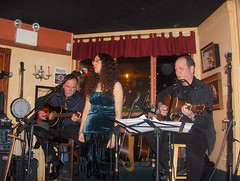I finally watched Barack Obama’s speech on race all the way through, and I have to say I’m tremendously impressed. After so many years of watching Democrats run and hide from anything that might offend anyone — Bill’s endless demoralizing triangulations, Hillary’s cynical poll-following, most of Congress’ opposition to a war they were too cowardly to vote against — his speech is a momentous occasion if for no other reason than that he actually stood up for his beliefs. If he’d followed the typical political playbook, he would have renounced the Rev. Wright as if he’d suddenly discovered that his pastor, who’d married him and baptized his children, was a terrible person with whom he could not possibly associate.
He managed to explain why Wright says the things he does without belittling the man, to explain Wright’s statements fairly and sensibly without endorsing them. He talked frankly about race, more courageously than any politician I remember. He spoke uncomfortable truths to whites that they need to hear, and challenged the black community to acknowledge that things have changed, even if they haven’t changed enough. And he called on us all to address the real enemy:
Like the anger within the black community, [white] resentments aren’t always expressed in polite company. But they have helped shape the political landscape for at least a generation. Anger over welfare and affirmative action helped forge the Reagan Coalition. Politicians routinely exploited fears of crime for their own electoral ends. Talk show hosts and conservative commentators built entire careers unmasking bogus claims of racism while dismissing legitimate discussions of racial injustice and inequality as mere political correctness or reverse racism.
Just as black anger often proved counterproductive, so have these white resentments distracted attention from the real culprits of the middle class squeeze–a corporate culture rife with inside dealing, questionable accounting practices, and short-term greed; a Washington dominated by lobbyists and special interests; economic policies that favor the few over the many. And yet, to wish away the resentments of white Americans, to label them as misguided or even racist, without recognizing they are grounded in legitimate concerns – this too widens the racial divide, and blocks the path to understanding.
I’ve said previously that I regret having voted for Clinton, but didn’t necessarily wish I’d voted for Obama; I’d seen nothing so far to impress me. Now I have. He didn’t talk to me as if I were an idiot. That’s unique in politics nowadays, and in the media. I joke about the reasons that I don’t have a television: I don’t like being yelled at, and I don’t like being treated like an idiot. This is the first campaign speech I’ve watched in some time that didn’t do both. He deserves the nomination for that reason alone; for not only refusing to lower himself to Clinton’s increasingly ugly level, but stepping above her and saying important things to the entire country.
Even The Wall Street Journal’s editorial page today published a thoughtful discussion of the speech that gave Obama a great deal of credit for not lowering himself to the typical level of political speechmaking (although of course asking innocently why anyone would think things were bad in the U.S.) Peggy Noonan says, admiringly,
He didn’t have applause lines. He didn’t give you eight seconds of a line followed by clapping. He spoke in full and longish paragraphs that didn’t summon applause. This left TV producers having to use longer-than-usual soundbites in order to capture his meaning. And so the cuts of the speech you heard on the news were more substantial and interesting than usual, which made the coverage of the speech better. People who didn’t hear it but only saw parts on the news got a real sense of what he’d said.
If Hillary or John McCain said something interesting, they’d get more than an eight-second cut too. But it works only if you don’t write an applause-line speech. It works only if you write a thinking speech.
I don’t know if this speech will get him elected president, but if all he does is encourage some thoughtful conversation, instead of the cheap shots and insulting assumptions most political candidates make, we’ll all be better off. If not, as he said, “we’ll be talking about some other distraction. And then another one. And then another one. And nothing will change.”





